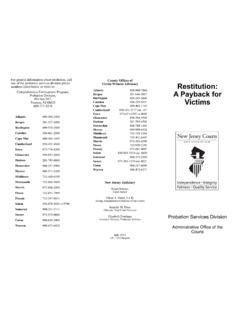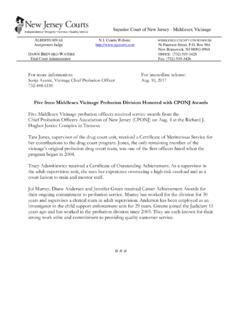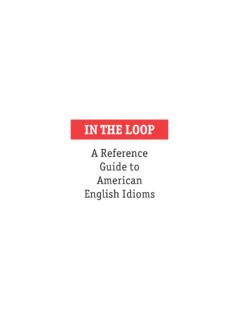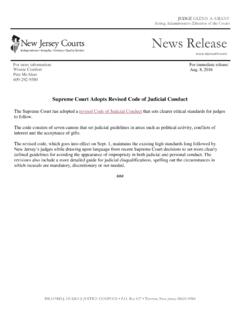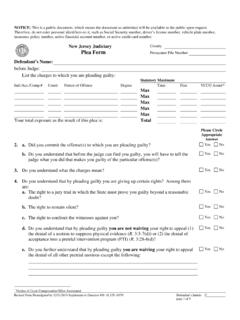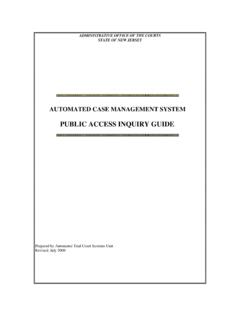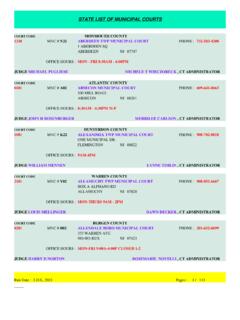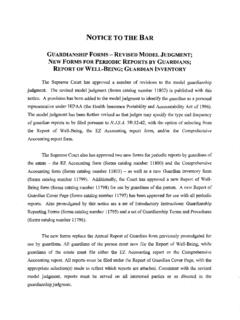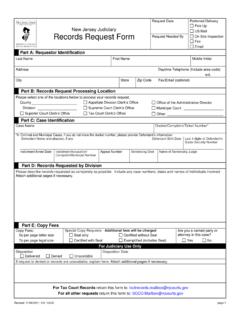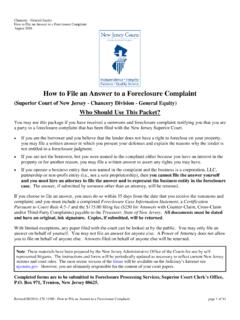Transcription of Rule 4-14 Depositions Upon Oral Examination
1 RULES GOVERNING THE COURTS OF THE STATE OF NEW JERSEY RULE 4:14. Depositions UPON ORAL Examination 4:14-1. When Depositions May Be Taken Except as otherwise provided by R. 4:14-9(a), after commencement of the action, any party may take the testimony of any person, including a party, by deposition upon oral Examination . Leave of court, granted with or without notice, must be obtained only if the plaintiff seeks to take a deposition prior to the expiration of 35 days after service of the summons and complaint upon the defendant by any manner, except that leave is not required if the defendant has already served a notice of taking deposition or otherwise sought discovery. The attendance of witnesses may be compelled by subpoena as provided in R. 4:14-7. The deposition of a person confined in prison may be taken only by leave of court on such terms as the court prescribes. Note: 4:16-1. Former rule deleted and new R.
2 4:14-1 adopted July 14, 1972 to be effective September 5, 1972 (formerly R. 4:10-1); amended July 21, 1980 to be effective September 8, 1980; amended July 10, 1998 to be effective September 1, 1998; amended July 5, 2000 to be effective September 5, 2000. 4:14-2. Notice of Examination ; General Requirements; Deposition of Organization (a) Notice. Except as otherwise provided by R. 4:14-9(b), a party desiring to take the deposition of any person upon oral Examination shall give not less than 10 days notice in writing to every other party to the action. The notice shall state the time and place for taking the deposition, which shall be reasonably convenient for all parties, and the name and address of each person to be examined, if known, and, if the name is not known a general description sufficient to identify the person or the particular class or group to which the person belongs. If a defendant fails to appear or answer in any civil action within the time prescribed by these rules, Depositions may be taken without notice to that defendant.
3 (b) Time. The court may for cause shown enlarge or shorten the time for taking the deposition. (c) Organizations. A party may in the notice name as the deponent a public or private corporation or a partnership or association or governmental agency and designate with reasonable particularity the matters on which Examination is requested. The organization so named shall designate one or more officers, directors, or managing agents, or other persons who consent to testify on its behalf, and may set forth for each person designated the matters on which testimony will be given. The persons so designated shall testify as to matters known or reasonably available to the organization. (d) Production of Things. The notice to a party deponent may be accompanied by a request made in compliance with and in accordance with the procedure stated in R. 4:18-1 for the production of documents and tangible things at the taking of the deposition.
4 Note: 4:20-1. Former rule deleted and new R. 4:14-2 adopted July 14, 1972 to be effective September 5, 1972 (formerly in R. 4:10-1 and 4:14-1); paragraph (a) amended July 21, 1980 to be effective September 8, 1980; paragraphs (a) and (c) amended July 13, 1994 to be effective September 1, 1994. 4:14-3. Examination and Cross- Examination ; Record of Examination ; Oath; Objections (a) Examination and Cross- Examination . Examination and cross- Examination of deponents may proceed as permitted in the trial of actions in open court, but the cross- Examination need not be limited to the subject matter of the Examination in chief. (b) Oath; Record. The officer before whom the deposition is to be taken shall put the witness on oath and shall personally, or by someone acting under the officer's direction and in the officer's presence, record the testimony of the witness . The testimony shall be recorded and transcribed on a typewriter unless the parties agree otherwise.
5 (c) Objections. No objection shall be made during the taking of a deposition except those addressed to the form of a question or to assert a privilege, a right to confidentiality or a limitation pursuant to a previously entered court order. The right to object on other grounds is preserved and may be asserted at the time the deposition testimony is proffered at trial. An objection to the form of a question shall include a statement by the objector as to why the form is objectionable so as to allow the interrogator to amend the question. No objection shall be expressed in language that suggests an answer to the deponent. Subject to R. 4:14-4, an attorney shall not instruct a witness not to answer a question unless the basis of the objection is privilege, a right to confidentiality or a limitation pursuant to a previously entered court order. All objections made at the time of the Examination to the qualifications of the officer taking the deposition or the person recording it, or to the manner of taking it, or to the evidence presented, or to the conduct of any party, and any other objection to the proceedings, shall be noted by the officer upon the deposition.
6 Evidential objections to a videotaped deposition of a treating physician or expert witness which is taken for use in lieu of trial testimony shall be made and proceeded upon in accordance with R. 4:14-9(f). (d) No Adjournment. Except as otherwise provided by R. 4:14-4 and R. 4:23-1(a) all Depositions shall be taken continuously and without adjournment unless the court otherwise orders or the parties and the deponent stipulate otherwise. (e) Written Questions. In lieu of participating in an oral Examination , parties may serve written questions in a sealed envelope on the party taking the deposition and that party shall transmit them to the officer, who shall propound them to the witness and record the answers verbatim. (f) Consultation With the Deponent. Once the deponent has been sworn, there shall be no communication between the deponent and counsel during the course of the deposition while testimony is being taken except with regard to the assertion of a claim of privilege, a right to confidentiality or a limitation pursuant to a previously entered court order.
7 Note: 4:16-3, 4:20-3. Paragraphs (b), (d) and (e) amended July 14, 1972 to be effective September 5, 1972 (Paragraph (a) formerly R. 4:10-3); paragraph (c) amended July 21, 1980 to be effective September 8, 1980; paragraphs (b) and (e) amended July 13, 1994 to be effective September 1, 1994; paragraph (c) amended and paragraph (f) added June 28, 1996 to be effective September 1, 1996. 4:14-4. Motion or Application to Terminate or Limit Examination or for Sanctions At any time during the taking of the deposition, on formal motion or telephone application to the court of a party or of the deponent and upon a showing that the Examination or any part thereof is being conducted or defended in bad faith or in such manner as unreasonably to annoy, embarrass or oppress the deponent or party, or in violation of R. 4:14-3(c) or (f), the court may order the person conducting the Examination to cease forthwith from taking the deposition, or may limit the scope and manner of the taking of the deposition as provided in R.
8 4:10-3. If the order made terminates the Examination , it shall be resumed thereafter only upon further order of the court in which the action is pending. Upon demand of the objecting party or deponent, the taking of the deposition shall be suspended for the time necessary to make a motion or telephone application for an order. The provisions of R. 4:23-1(c) shall apply to the award of expenses incurred in making or defending against the motion or telephone application. Note: 4:20-4. Amended July 14, 1972 to be effective September 5, 1972; amended June 28, 1996 to be effective September 1, 1996. 4:14-5. Submission to witness ; Changes; Signing If the officer at the taking of the deposition is a certified shorthand reporter, the witness shall not sign the deposition. If the officer is not a certified shorthand reporter, then unless reading and signing of the deposition are waived by stipulation of the parties, the officer shall request the deponent to appear at a stated time for the purpose of reading and signing it.
9 At that time or at such later time as the officer and witness agree upon, the deposition shall be submitted to the witness for Examination and shall be read to or by the witness , and any changes in form or substance which the witness desires to make shall be entered upon the deposition by the officer with a statement of the reasons given by the witness for making them. The deposition shall then be signed by the witness . If the witness fails to appear at the time stated or if the deposition is not signed by the witness , the officer shall sign it and state on the record the fact of the witness ' failure or refusal to sign, together with the reason, if any, given therefor; and the deposition may then be used as fully as though signed, unless on a motion to suppress under R. 4:16-4(d) the court holds that the reasons given for the refusal to sign require rej ection of the deposition in whole or in part. Note: 4:20-5.
10 Amended July 14, 1972 to be effective September 5, 1972; amended July 13, 1994 to be effective September 1, 1994. 4:14-6. Certification and Filing by Officer; Exhibits; Copies (a) Certification and Filing. The officer shall certify on the deposition that the witness was duly sworn and that the deposition is a true record of the testimony. The officer shall then promptly file with the deputy clerk of the Superior Court in the county of venue a statement captioned in the cause setting forth the date on which the deposition was taken, the name and address of the witness , and the name and address of the reporter from whom a transcript of the deposition may be obtained by payment of the prescribed fee. The reporter shall furnish the party taking the deposition with the original and a copy thereof. Depositions shall not be filed unless the court so orders on its or a party s motion. The original deposition shall, however, be made available to the judge to whom any proceeding in the matter has been assigned for disposition at the time of the hearing or as the judge may otherwise request.
